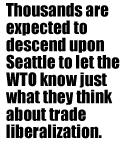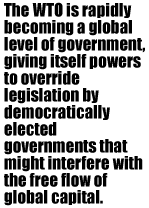|
Vicky Smallman 1. The World Trade Organization is kicking off its Millennium Round negotiations in Seattle, November 30 to December 3. And where heads of state and trade ministers meet, activists are bound to follow. Thousands are expected to descend upon Seattle to let the WTO know just what they think about trade liberalization. 2. The WTO was established in 1995 as the supra-national institution that governs and negotiates the world's trade and investment rules. Currently, 134 countries are members. The WTO agreements are far-reaching, covering food and environmental standards, government regulation of services, farm policy, cultural protections, copyright and patent law, tax subsidies, and more. 3. The Millennium Round proposes to open up these agreements and to throw in a few new areas to boot. And we should be worried, for many reasons. 4. In short, the philosophy of the WTO is that all social and environmental goals must be set aside in favour of greater trade and investment liberalization. Sure, this is great if you're a large transnational corporation, but it doesn't do much for the public interest. And as if that weren't enough, the World Trade Organization is rapidly becoming a global level of government, giving itself powers to override legislation by democratically elected governments that might interfere with the free flow of global capital. Governments that put in place legislation that, say, bans a chemical substance known to be environmentally dangerous, can be forced to withdraw it to comply with WTO edicts. 5. Fortunately, this attack on social and economic justice has not gone unnoticed. The Internet has been a major catalyst in the development of an international movement against unfettered trade liberalization. By using the Web to share information and mobilize for local and international actions, a growing network of non-governmental organizations, citizens' groups and activists-at-large were instrumental in defeating one attempt to negotiate a global agreement on investment (the MAI). The Seattle meeting is the next opportunity to bring together advocates and activists from around the world to promote a different kind of globalization--one that is driven by a commitment to human rights and democratic development. 6. Academic workers should take an interest in the Millennium Round. There isn't much analysis yet on the potential impacts for postsecondary education, but don't let that lull you into a false sense of security. Education is on the agenda, along with other public services like health care and social assistance. Education International, a federation of educational workers' unions from around the world, has produced a report that sets out what's at stake (see below for the link). There's a lot we have to consider. You think tenure would survive a WTO dispute hearing if an agreement on education services were reached? How about full-time, part-time ratios? It's about time our movement started thinking--and acting--globally. 7. There's plenty of great information on the Internet about the WTO and related issues. And there are lots of ways you can get involved in the activists' plans for Seattle. Here are some links to get you started: http://www.seattlewto.org/ - For the most up-to-date information about the mobilization against the Millennium Round. Check out their links page. http://www.ei-ie.org/pub/english/epbeipsiwto.html - Education International's perspective on the the WTO and education. EI is a federation of educational workers' unions - our voice on the global stage. (Thanks to Jon Curtiss for supplying this link.) http://www.citizen.org/ - The home page of Public Citizen, a US citizen advocacy group. Click on "Global Trade Watch". http://www.canadians.org/ - The home of the Council of Canadians, a citizen advocacy group. http://www.twnside.org.sg/ - The Third World Network, an excellent source for alternative economic and political analysis. http://www.ifg.org/- The International Forum on Globalization. http://www.sierraclub.ca/national/trade-env/ - Canada's Common Front on the WTO. http://www.corpwatch.org/ - Keeping an eye on Corporate Rule. http://www.aflcio.org/ or http://www.clc-ctc.ca/ - For a labor perspective (or, if you're Canadian, a labour perspective!) http://www.corporations.org/democracy/wto.html - For an education perspective. http://www.foe.org - For an environmental perspective. http://www.adbusters.org/ or http://www.ruckus.org - Creatively kicking corporate butt. http://www.wto.org/ - Straight from the horse's mouth. http://www.indymedia.org - independent media coverage of Seattle protest events. Find out what really happened!
Vicky Smallman, Canadian Association of University Teachers |
|

